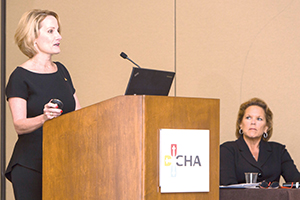By BETSY TAYLOR
ORLANDO, Fla. — Patients want predictive pricing — or the ability to understand with some degree of certainty what it will cost to receive services before they actually do — said two Ascension executives leading an Innovation Forum at the Catholic Health Assembly last month.
Tracy Rogers, chief operating officer for Ascension's Wisconsin ministry market, which includes 27 hospitals, and Kim Hodgkinson, then chief financial officer for Ascension's Jacksonville, Fla., ministry market, which includes three hospitals, spoke about a pilot project in Jacksonville. Started last year, the project was designed to assess consumer receptivity and preferences around predictive pricing for health care services.

Tracy Rogers, left, and Kimberly Hodgkinson
Ascension developed a "shop, book, pay" online approach, where patients in the pilot visited a website, jaxezappointment.com, read a description of an imaging procedure, saw how much it would cost them and were able to schedule an appointment. If a patient prepaid online or paid at the time of the service, the patient received a discount on the procedure. If the patient had insurance, he or she submitted insurance information. A financial counselor contacted that patient with the estimated costs for the procedure.
Ascension is exploring the predictive pricing model at a time when consumers are seeking more information related to pricing, quality and access as high-deductible plans and co-pays shift more out-of-pocket costs to patients.
The speakers said there were 6,782 visits to the website from last fall into this spring, with 104 people logging in to establish an account and 59 people who then scheduled procedures at one of three imaging sites in the Jacksonville area. Ascension also conducted focus groups in Jacksonville and Chicago to better understand the information patients seek related to price transparency. Focus group participants wanted to know their financial responsibility, have the ability to compare prices and locations, and receive services from a provider they trust or that their physician trusts. Participants said they like cash discounts, and some wanted even greater discounts than they were offered.
Rogers and Hodgkinson said 16 executives across Ascension are working together on a plan related to predictive pricing, to develop a model.
"We have to be steeped in data relative to our costs," Rogers noted. Part of the ongoing work to develop predictive pricing offerings involves communicating with payers and providers about costs and prices for services. The speakers said they see an opportunity for collaboration with payers as the work on the model moves forward.
The speakers said the predictive pricing model will have to account for market variations related to costs and pricing and varying levels of access to technology platforms in different markets and among different patients.
Rogers said that providers seeking to use transparent pricing to attract consumers away from competitors should not specifically aim to offer the lowest prices in a market. Patients aren't just motivated by price, they want quality services. They also want to know they're having tests or procedures done by a trusted provider.
She said the system is making sure its predictive pricing model supports ways to assist patients struggling to pay their health care costs, such as with payment plans and connections to loan services.
"Don't assume what your consumers want," she said, noting that different customers are seeking different things. Some patients, she said, might want "off-hours pricing" where they'd choose to have a scan or test done late at night or in the early morning in exchange for a reduction in their personal costs.
Since the assembly, Hodgkinson moved to Vancouver, Wash.-based PeaceHealth, where she is executive vice president and chief financial officer.
Copyright © 2016 by the Catholic Health Association
of the United States
For reprint permission, contact Betty Crosby or call (314) 253-3477.